#diversity chief
Explore tagged Tumblr posts
Text
By: Adam B. Coleman
Published: May 17, 2024
The law of attraction dictates that you attract what you are, so it is by no coincidence that the Diversity Industrial Complex often attracts con artists.
It’s an industry predicated on siphoning phoning money from gullible corporations who are desperate to project themselves as societal changemakers.
This is how immoral people like ex-Facebook and Nike diversity program manager, Barbara Furlow-Smiles, were able to extract millions of dollars from resource abundant corporations.
Smiles, who led the diversity, equity, and inclusion (DEI) programs for Facebook from January 2017 to September 2021, pleaded guilty in December to a wire fraud scheme that helped her steal more than $4.9 million from Facebook and a six-figure sum from Nike.
Atlanta US Attorney Ryan Buchanan lamented how Smiles was “utilizing a scheme involving fraudulent vendors, fake invoices, and cash kickbacks.”
“After being terminated from Facebook, she brazenly continued the fraud as a DEI leader at Nike, where she stole another six-figure sum from their diversity program,” Buchanan stated.
Smiles used her authority to approve invoices to pay for services and events that never occurred, funneling the money to several personal associates and pay Smiles in kickbacks.
She would later submit fake expense reports claiming her associates completed work for Facebook, such as providing marketing help and merchandise fulfillment.
Smiles’ lavish lifestyle will be replaced with a stiff punishment of five years imprisonment, three years of supervised release and an order to pay back the money she stole from both Facebook and Nike.
There is something apropos about a sham employee like Smiles being able to climb the ranks of a sham sector of corporate America.
Post-George Floyd’s death, business enterprises fell in love with — or were backmailed into — the idea of a marriage between capitalism and social philanthropy.
DEI job positions increased 123% between May and September of 2020, according to Indeed.
It was no longer enough to have financial success in the business environment, they now wanted to become adored by the public — or at least not be accused of white supremacy.
But when you’re desperate for an outcome, there will always be fraudsters waiting to exploit you.
DEI is a sham because you can’t quantify if it’s succeeding. There are never enough programs or seminars or representation — it just keeps expanding.
Smiles likely was able to get away with what she was doing for years at Facebook because DEI is treated like a new romance; constantly given the benefit of the doubt despite their red flags.
Falling for a scam has nothing to do with intelligence or experience; literally anyone can get scammed.
We fall for scams when we become so desperate for an outcome that we’re willing to suspend belief and overlook common sense.
The problem is that ego prevents industry leaders from hearing our warnings about the falsehoods they’re being fed.
People who believe they’re always the smartest ones in the room won’t conceive how they’re being played by ideological nitwit college graduates who are motivated by ending capitalism.
They’re scared of being accused of being racist, and thus surround themselves with con artists who enjoy manipulating their empathy to drain their wealth.
Corporate America loves chasing love; DEI loves their money.
Adam B. Coleman is the author of “Black Victim to Black Victor” and founder of Wrong Speak Publishing. Follow him on Substack: adambcoleman.substack.com.
--
See:
==
DEI is inherently fraudulent. It's premised upon fraudulent grievance "scholarship," it's unquantifiable, untestable and unfalsifiable, and will accuse you of istaphobism for expecting that its objectives should be quantifiable, testable and falsifiable. Much like traditional religion.
In practice, it's like doing phrenology or dowsing for hidden "bigotry," and "curing" it with more identity homeopathy.
So, it's unsurprising that a fraudulent industry is rife with frauds. We've seen non-stop academic fraud and plagiarism from DEI academics, so we should expect comparable fraud from DEI practitioners.
Interesting how these DEI types are usually raging anti-capitalists, though.
#Adam B. Coleman#Barbara Furlow Smiles#DEI#diversity equity and inclusion#diversity#equity#inclusion#DEI must die#DEI bureaucracy#fraud#diversity chief#diversity officer#corruption#grifters#grifters gonna grift#con artist#scam artists#religion is a mental illness
8 notes
·
View notes
Text
“What we are seeing (was) largely preventable,” talk show host Megyn Kelly said on her show. “LA’s fire chief has made not filling the fire hydrants top priority, but diversity.”
There’s no evidence that Crowley’s efforts to diversify the department have hampered the fight. The Los Angeles Department of Water and Power is in charge of providing water for the hydrants, and its leaders have said they were overwhelmed by the intense demand on a municipal system not designed to fight wildfires, particularly as firefighting aircraft was grounded. Gov. Gavin Newsom has ordered an investigation into what happened, and Crowley herself added to the criticism.
This followed several days of Crowley getting swept into the national political fray over diversity, equity and inclusion policies that conservatives believe have gone too far in American institutions. Crowley, who is openly gay and the city’s first female fire chief, has made diversifying the overwhelmingly male department a priority.
44 notes
·
View notes
Text
I thought DIVERSITY & INCLUSION was a good thing? 🤔
It wasn't enough for Disney and Serena Williams to spit on Pat Tillman's legacy, they doubled down by publicly berating Harrison Butker.
Despite the NFL's reputation as the National Felons League, Harrison Butker chooses to be an upstanding citizen & athlete, deeply committed to his Catholic faith and values.
Serena & Venus used their Espy Platform to CATHOLIC shame Kansas City Chiefs' super bowl winner, Harrison Butker.
A CATHOLIC university invited Butker to inspire their graduating class. Harrison dared to encourage EVERYONE (including the women with a desire to become mothers and homemakers) to be proud and unashamed.
youtube

#harrison butker#cancel espn#serena williams#venus williams#woke#rude#kansas city chiefs#trashy not classy#super bowl winner#catholic#diversity#Do Better Disney#unashamed#ignore bitter women#looking forward to the markling#jill smoller#wme#mean girls
44 notes
·
View notes
Text
Oh my god???....The feminism,, in the halo series. I love that for them
#don't get me wrong on the whole it's not good and NOT halo#but I don't dislike most of the characters and it's not the actors fault the directing. writing and editing is shoddy#but my goodness. The diversity in women here is something i ...don't know if i've seen before???#Which is pathetic to even say but like wow. that's pretty neat#i like kai. i hope she has a nice day.#To reiterate this is NOT halo nor a halo story. The only thing done well there is vaguely some casting#(*ofcourse Cortana and Halsey kinda) and ofcourse that master chief costume is fucking incredible and i cannot tell everyone enough#just how much I NEED it#*I also am aware that halo lore is diverse in it's nature to begin with but it's nice to actually see it in this media. Instead of like....#For every 6 guys there's one girl and she's just kinda there to be pretty#So that's one big positive there.#halo#halo series#hi tumblr i have not been here for so long and have so many things to rave about that happened but i need to put this here now
9 notes
·
View notes
Text
The real world is so much better than this virtual reality we engage in.
I appreciate engaging with strangers from very different backgrounds that I randomly meet on the street, respectfully talking about politics in small groups (even when we don’t agree on everything), and realizing there are still many reasonable, kind, and open minded people in the world … especially in the least likely places (at least according to media).
I even get hugs out of these sorts of exchanges.
Life is so generous to us when we aren't attached to how the generosity shows up.
#real world#virtual reality#meet someone#free hugs#diversity#politics#there is hope#people are kind#life is good#come together#united we stand#community matters#healer in chief#sorinne ardeleanu#soul food for thought#social media#fake news
0 notes
Text
Trump fires CQ Brown in Pentagon shake-up
#Chairman of the Joint Chiefs of Staff#cq brown#diversity#inclusion#meme#memes#military#news#pentagon#Pete Hegseth#trump#woke
1 note
·
View note
Text


"What do you do, Jess?"
"I also work for an association with universities to help them diversify their faculties. You probably can't make fun of that."
"You underestimate how good I am at crowd work. I can't see you, but my guess is the way you said that, and the tone, are you a white woman? 'I think we should diversify every position except the one that I hold, if I'm gonna be... I think we should get more black people in here, except not my job, my job should be a white woman.'"
#The Rabbit Hole#diversity officer#chief diversity officer#DEI bureaucracy#diversity#equity#inclusion#diversity equity and inclusion#DEI bullshit#white women#intersectional feminism#religion is a mental illness
5 notes
·
View notes
Text
I began to read Thérèse Raquin and titular character lowkey reminds me of Heathcliff in that both are of ambiguous upbringing and have a certain racial distinction that's apparently never addressed in media or adaptations
(it's an unfair comparison, I'll admit it, in that the racial component is important to Heathcliff's character and how others perceive him and he is visibly othered, while apparently Thérèse isn't)
#it days her mother was an indigenous African and that she was the daughter of a tribe chief also that therese was born in oran (?)#so i think the implication is her mother is of amazigh or if we dont take the 'indigenous' literally i guess she could be arab?#therese does not seem to be othered based on appareance like heathcliff is though but to be fair i'm under the impression that french#society of the time and in the lower middle class zola describes was somewhat more 'open' or less 'bothered' about race and diversity than#english society though i could be absolutely wrong on that like please don't quote me on this but i do get that impression and I'm not#implying french reception/inclusion was necessarily better just different#laura reads#but in any case. no north african woman playing therese that i know of same no rroma/indian even mediterranean actor playing heathcliff lol
0 notes
Text
chemical engineering

#Chemistry Conferences 2025: A glance Into the Future of Chemical Science#The world of chemistry is always evolving#with finding#technologies#and function arising every day. For researchers#professionals#and students#attending Chemistry Conferences is an critical way to stay informed#network#and cooperate with top authorities in the sector. Looking ahead to Chemistry Conferences 2025#it is clear that the coming events will open out some of the most eye-catching originality in science and research technology. Between them#the Chemistry Congress 2025 will be one of the most chief global events.#This blog profile the most important events for approaching Chemistry Conferences in 2025#especially with consider to the Chemistry Congress#Medicinal Chemistry Conferences#Global Chemistry Conferences#Organic Chemistry Conference 2025#and the Chemical Engineering Conference 2025. apart from that#we will move into the Chemistry Seminar and Workshop Chemistry Congress#such as the International Conference on Chemical Engineering in Zurich#Switzerland.#Chemistry Congress 2025: The lead ship Event#Chemistry Congress 2025 will be one of the large and most expect events in the world of chemical sciences. This congress is proceed to happ#Germany#and thousands of members from all over the world are anticipate to be present at this event#hoping to inspect the most latest updates in chemistry. This multi-day event will characteristic a diversity of scientific sessions#including conference#workshops#and networking events#concentrating on different topics in chemistry.
0 notes
Text
is there a version of the soapy cilantro gene but for mango? everyone raves about mango but it tastes like window cleaner to me. am i alone in this? am i the sole outcast in a doomed world, bereft of mango?
#i do NOT have the soapy cilantro gene ftr#i love cilantro#but mango just ain't it chief#i don't actually feel any loss about not liking it#i like tons of foods that seem to be generally unpopular#humanity is diverse and varied. it's whatever#but i am genuinely curious if there's a reason for this#if no one knows i will look it up and report back
1 note
·
View note
Text
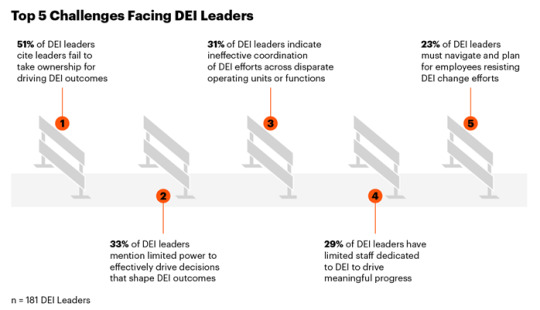
Fifty one percent of diversity, equity and inclusion (DEI) leaders say their top challenge is business leaders failing to take ownership for driving DEI outcomes, according to Gartner, Inc. (via Gartner HR Survey Identifies Top Five Challenges Facing DEI Leaders | Gartner)
See also A Global Look at the Chief Diversity Officer Landscape by Russell Reynolds
0 notes
Text
#Chief Strategic Development Officer#UNICEF UK job opening#London#Permanent#Circa £125#000 per annum#Part home/Part office (London) based#strategic development#UNICEF UK#leadership#collaboration#ambitious strategies#innovation#inclusive leadership#values-led leader#executive team#children's organization#flexible working#generous annual leave#pension#big brand discounts#wellbeing tools#open plan office space#Queen Elizabeth Olympic Park#diversity and inclusion#black#Asian#minority ethnic candidates#LGBTQ+ candidates#disabled candidates
1 note
·
View note
Text
Celebrating Environmental Stewardship and Sustainable Practices

View On WordPress
#activism#advocacy#biodiversity#Black History#Black History Month#CARBON FOOTPRINT#Chief Josiah Njonjo#Clean Energy#Climate Action#climate change#climate crisis#collaboration#community building#Community Engagement#conservation#diversity#economic justice#Ecosystem#empowerment#Environmental Activism#environmental advocacy#environmental awareness#environmental challenges#Environmental Citizenship#environmental conservation#environmental degradation#Environmental Education#environmental equity#environmental governance#environmental impact
0 notes
Text
Key Trends Shaping the Future of Corporate Compliance
Corporate compliance functions are entering a new era of rapid transformation, driven by technological advances, regulatory shifts and stakeholder pressures surrounding sustainability. By understanding critical developments in compliance operating models, risk management approaches and oversight frameworks, leaders can proactively position their organizations for long-term success.
Digitization to Enable “Compliance by Design”

Automation through robotic process automation (RPA), artificial intelligence and advanced analytics is empowering next-generation compliance. Machine learning facilitates real-time audits, gathering intelligence across transactions, communications and ecosystem signals to identify regulatory exposure. Self-updating compliance manuals tuned to latest ordinance shifts are on the horizon. The end vision is embedding compliance through system design across operations.
Focus Expanding Beyond Narrow Regulations
With intensifying scrutiny by investors, employees and society on ethical conduct, compliance roles are ballooning beyond narrowly meeting legal obligations alone to championing holistic integrity. Leading organizations are tying codes of conduct to societal value frameworks addressing diversity, sustainability and equitable impacts surrounding products and services. Data transparency, anti-corruption and human rights commitments are rising in priority.
Centralized Governance with Localized Operations
Global companies are moving towards centralized compliance governance under chief ethics/compliance officers and committees to align policies while localizing procedures. Geographic and divisional compliance heads are being empowered to tailor training programs using cultural nuances and localized languages to make integrity standards intuitively resonate across borders rather than appear disconnected edicts from headquarters.
Ultimately corporate compliance is maturing into a value creation function contributing towards trust and transparency with stakeholders rather than merely a check-the-box necessity. As guardians of integrity underpinning quality, fairness and reliability commitments made across supply chains and communities, compliance is becoming an ethical backbone driving capitalism’s next chapter.
#Corporate compliance trends#Compliance technology#Compliance automation#Compliance digitization#Compliance artificial intelligence#Compliance machine learning#Compliance analytics#Regulatory technology (RegTech)#Compliance audits#Compliance by design#Compliance scope expansion#Compliance ethics#Corporate social responsibility#ESG compliance#Sustainability compliance#Diversity and inclusion compliance#Human rights compliance#Anti-corruption compliance#Compliance governance#Chief Compliance Officer
1 note
·
View note
Text




By: Aaron Sibarium
Published: Jan 30, 2024
It's not just Claudine Gay. Harvard University's chief diversity and inclusion officer, Sherri Ann Charleston, appears to have plagiarized extensively in her academic work, lifting large portions of text without quotation marks and even taking credit for a study done by another scholar—her own husband—according to a complaint filed with the university on Monday and a Washington Free Beacon analysis.
The complaint makes 40 allegations of plagiarism that span the entirety of Charleston's thin publication record. In her 2009 dissertation, submitted to the University of Michigan, Charleston quotes or paraphrases nearly a dozen scholars without proper attribution, the complaint alleges. And in her sole peer-reviewed journal article—coauthored with her husband, LaVar Charleston, in 2014—the couple recycle much of a 2012 study published by LaVar Charleston, the deputy vice chancellor for diversity and inclusion at the University of Wisconsin-Madison, framing the old material as new research.
Through that sleight of hand, Sherri Ann Charleston effectively took credit for her husband's work. The 2014 paper, which was also coauthored with Jerlando Jackson, now the dean of Michigan State University's College of Education, and appeared in the Journal of Negro Education, has the same methods, findings, and description of survey subjects as the 2012 study, which involved interviews with black computer science students and was first published by the Journal of Diversity in Higher Education.

The two papers even report identical interview responses from those students. The overlap suggests that the authors did not conduct new interviews for the 2014 study but instead relied on LaVar Charleston's interviews from 2012—a severe breach of research ethics, according to experts who reviewed the allegations.
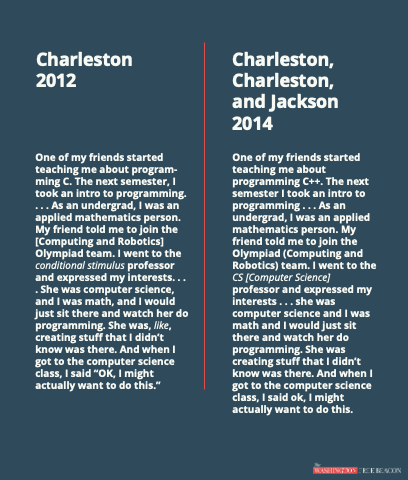
"The 2014 paper appears to be entirely counterfeit," said Peter Wood, the head of the National Association of Scholars and a former associate provost at Boston University, where he ran several academic integrity probes. "This is research fraud pure and simple."
Sherri Ann Charleston was the chief affirmative action officer at the University of Wisconsin-Madison before she joined Harvard in August 2020 as its first-ever chief diversity officer. In that capacity, Charleston served on the staff advisory committee that helped guide the university's presidential search process that resulted in the selection of former Harvard president Claudine Gay in December 2022, according to the Harvard Crimson.
A historian and attorney by training, Charleston has taught courses on gender studies at the University of Wisconsin, according to her Harvard bio, which describes her as "one of the nation's leading experts in diversity." The site says that her work involves "translating diversity and inclusion research into practice for students, staff, researchers, postdoctoral fellows and faculty of color."
Experts who reviewed the allegations against Charleston said that they ranged from minor plagiarism to possible data fraud and warrant an investigation. Some also argued that Charleston had committed a more serious scholarly sin than Gay, Harvard's former president, who resigned in January after she was accused of lifting long passages from other authors without proper attribution.
Papers that omit a few citations or quotation marks rarely receive more than a correction, experts said. But when scholars recycle large chunks of a previous study—especially its data or conclusions—without attribution, the duplicate paper is often retracted and can even violate copyright law.
That offense, known as duplicate publication, is typically a form of self-plagiarism in which authors republish old work in a bid to pad their résumés. Here, though, the duplicate paper added two new authors, Sherri Ann Charleston and Jerlando Jackson, who had no involvement in the original, letting them claim credit for the research and making them party to the con.
"Sherri Charleston appears to have used somebody else's research without proper attribution," said Steve McGuire, a former political theory professor at Villanova University, who reviewed both the 2012 and 2014 papers.
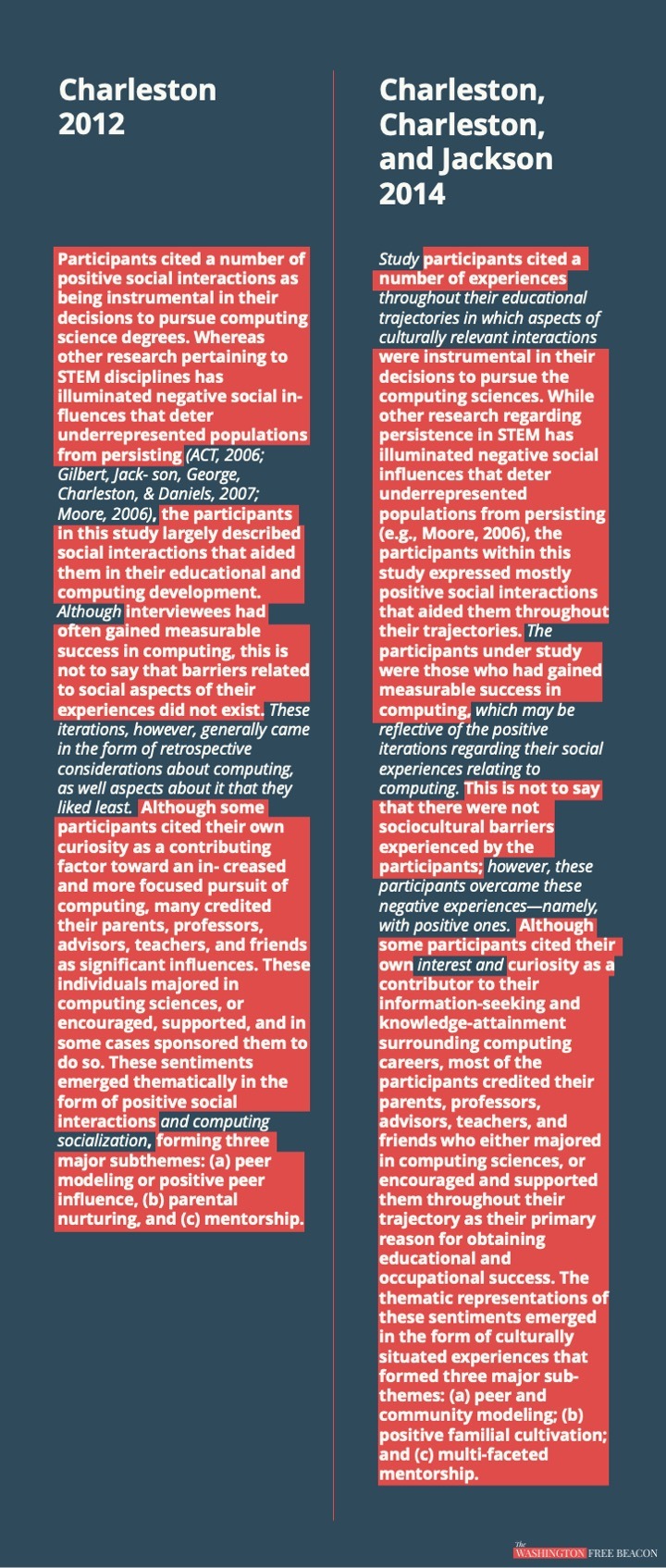
One-fifth of the 2014 paper, including two-thirds of its "findings" section, was published in the 2012 study, according to the complaint, and three interview responses are identical in both articles, suggesting they come from the same survey.
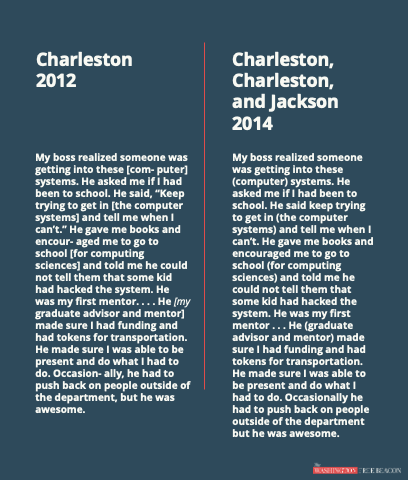
According to Lee Jussim, a social psychologist at Rutgers University, "it is essentially impossible for two different people in two different studies to produce the same quote." At best, he said, the authors got their wires crossed and mixed up interviews from two separate surveys, both of which just happened to involve 37 participants with the exact same demographic profile. At worst, the authors committed data fraud by framing old survey responses as new ones—a separate and more serious offense.
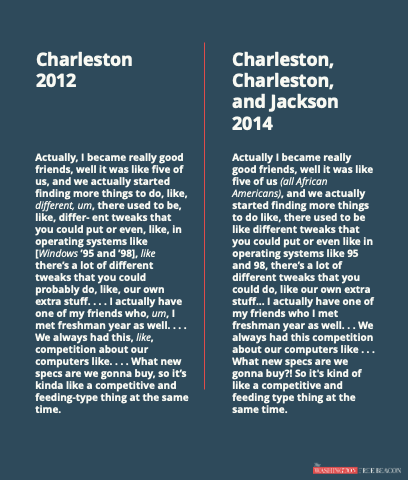
The Journal of Negro Education did not respond to a request for comment. Sherri Ann Charleston, LaVar Charleston, and Jerlando Jackson did not respond to requests for comment.

Monday's complaint, which was filed anonymously, comes as Harvard is facing questions about the integrity of its research affiliates and the ideology of its diversity bureaucrats, most of whom report to the sprawling office that Sherri Ann Charleston oversees.
The Dana-Farber Cancer Institute, one of Harvard Medical School's three teaching hospitals, announced in January that it would retract six papers and correct dozens more after some of its top executives were accused of data manipulation. That news came on the heels of a viral essay in which Carole Hooven, a Harvard biologist, described how she had been hounded out of a teaching role by her department's diversity committee after she said in an interview that there are only two sexes.
The school is also facing an ongoing congressional probe over its handling of anti-Semitism and its response to the plagiarism allegations against Gay, which Harvard initially sought to suppress with legal saber-rattling. Half of Gay's published work contained plagiarized material, ranging from single sentences to entire paragraphs, with some of the most severe lifts coming in her dissertation. Though Gay stepped down as president on January 2, she remains a tenured faculty member drawing a $900,000 annual salary.
Some of Charleston's offenses are similar to Gay's. In her 2009 dissertation, for example, Charleston borrows a sentence from Eric Arnesen's 1991 book Waterfront Workers of New Orleans: Race, Class, and Politics, 1863-1923, without quotation marks and without citing Arnesen's work in a footnote.
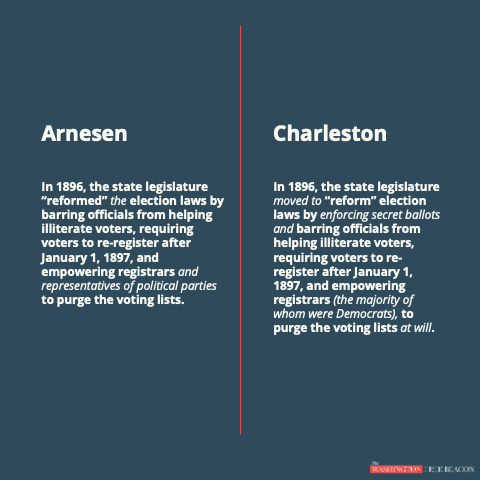
She also lifts full paragraphs from her thesis adviser, Rebecca Scott, while making minimal semantic tweaks.
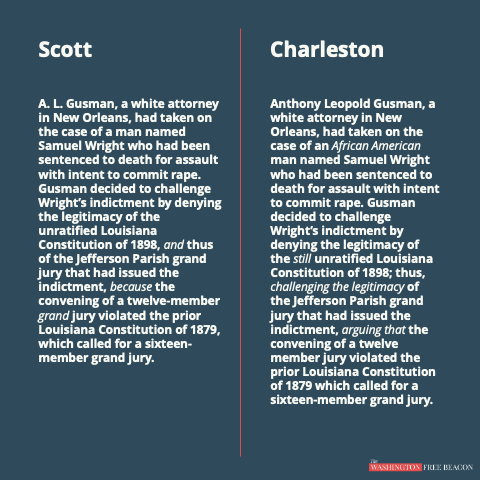
"There's simply not enough difference to consider them original words," said Jonathan Bailey, the founder of the website Plagiarism Today. "Though the sources in those examples are cited"—Charleston includes a footnote to Scott at the end of each passage—"the text either needed to be quoted or properly paraphrased."

Bailey added that the plagiarism of Scott alone merited an investigation—ideally, he said, "by a neutral party with no ties to either the school or the school's critics."
Harvard did not respond to a request for comment. Scott and Arnesen did not respond to requests for comment.
Charleston also lifted language from Louis Pérez, an historian at the University of North Carolina-Chapel Hill; Alejandro de la Fuente, an historian at Harvard; and Ada Ferrer, an historian at New York University, among other scholars.
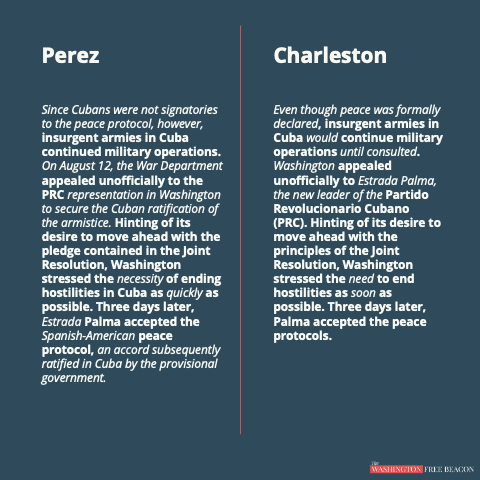
Charleston cites each source in a footnote but omits quotation marks around language copied verbatim. The omissions violate Harvard's Guide to Using Sources, a document produced for incoming students, which states that quotation marks are required when "you copy language word for word."
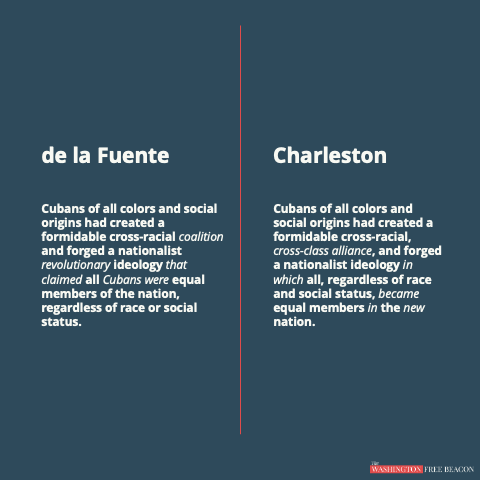
Pérez, de la Fuente, and Ferrer did not respond to requests for comment.

The range of examples presented in the complaint, which was also filed to the University of Michigan and the University of Wisconsin-Madison, highlights how plagiarism can shade into more severe forms of misconduct when it involves interviews or other data.
In fact, some experts said the term "plagiarism" didn't quite capture the dishonesty of duplicate publication, which is sometimes categorized as a separate offense and accounts for 14 percent of all paper retractions in the life sciences.
"You cannot just republish an old paper as if it is a new paper," Jussim, the Rutgers psychologist, said. "If you do, that is not exactly plagiarism; it's more like fraud."
Wood said the case was really a combination of the two offenses. "Because the second paper, on which Sherri Ann Charleston is one of the three co-authors, recycles so much of the text of the original paper by LaVar J. Charleston, this does have the earmarks of plagiarism, but the plagiarism is compounded by an even larger effort to deceive," he said. "The universities and journals need to investigate."
While scholars can reuse data across multiple papers, they must make clear when they are doing so and provide appropriate attribution to earlier studies, per guidelines from the Office of Research Integrity and the editorial policies of top academic journals, including Nature and Cell.
But the 2014 paper never indicates that it is reusing research from 2012. Instead, it claims to present new data that fill a "gap" in the literature and "corroborate" the 2012 study, among others, and on two occasions refers to survey subjects as "participants in this study."
Those participants appear to be the same people whom LaVar Charleston interviewed in 2012. Both surveys involved the same number of undergraduates, graduate students, Ph.D.s, and students at historically black colleges—all drawn from the same computer science conference—a similarity that experts said was a red flag.
"It is curious that the proportions are identical," said Debora Weber-Wulff, a German computer scientist who researches plagiarism and other forms of academic misconduct. "This would be grounds for the universities in question to request the data and investigate."
Jussim agreed. "This seems sufficiently improbable that, absent something saying they are re-reporting an already-published study, it would be fraud," he said.
LaVar Charleston did not respond to a request for comment about whether the two studies used the same interviews. The University of Michigan said it was "committed to fostering and upholding the highest ethical standards in research and scholarship," but declined to comment on the complaint. The University of Wisconsin-Madison told the Free Beacon it had "initiated an assessment in response to the allegations."
The main difference between the papers is a long section in the 2014 article about "culturally responsive pedagogy theory," which the authors say their findings support. Both articles are littered with the tropes of progressive scholarship, including a disclaimer about "positionality"—the authors assure readers that they reflected on their own "racial, gender, and socioeconomic status"—and a lament that computer science is a "White male-dominated field."
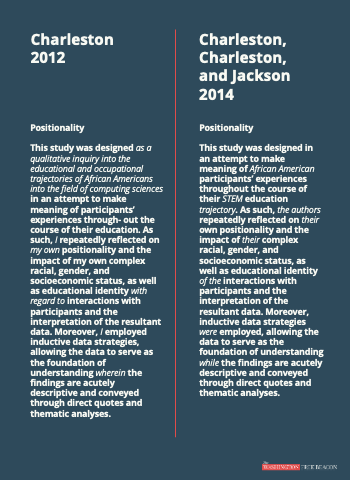
Both also criticize the idea that "computing sciences is for nerds, only for White people, [and] only for geniuses."
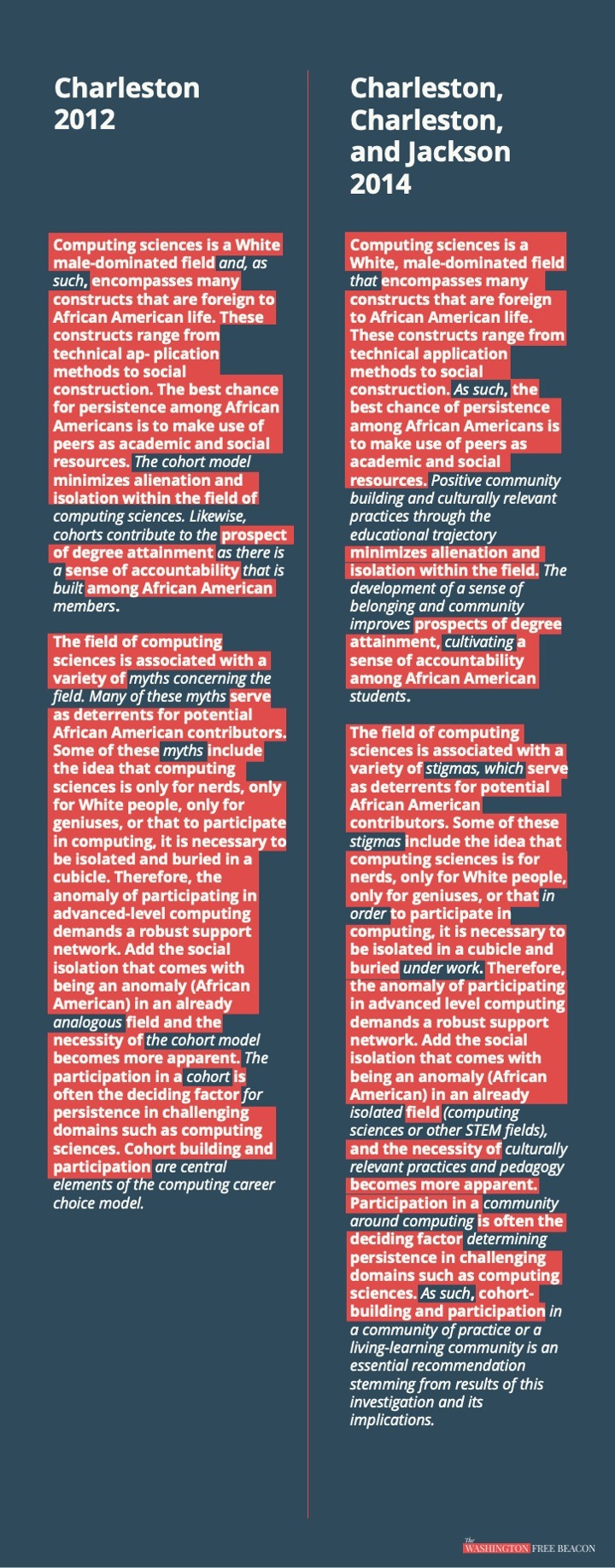
Such language is typical of the diversity initiatives Charleston oversees. Since 2020, her office has pumped out a stream of materials that bemoan the "weaponization of whiteness," discuss the ins and outs of "white fragility," and urge students to "call out" their peers for "harmful words." One message, signed by Charleston herself, was titled "A Call to Dismantle Intersecting Oppressions."
"We must continue to work against systematic oppression in all its forms—racism, sexism, homophobia, ableism, and more," she wrote.
Her office also curates resources for students seeking to become fluent in progressive patois, including a "glossary of diversity, inclusion and belonging (DIB) terms" that provides examples of "gaslighting."
Tactics can include "shooting down the target's ideas," the entry reads—or "taking credit for them."
==
Here we go again...
If you haven't already figured it out, the DEI-related faux-"disciplines" - the "Studies": Ethnic Studies, Women's Studies, Gender Studies, Postcolonial Studies, Media Studies, etc - are the most corrupt, the most ideological with the absolute lowest academic standards of all. All they care about is echoing back the "correct" opinions, not valid scholarship.
And yet, somehow these lunatics and fanatics end up the most powerful people in the asylum.
Harvard needs to fumigate the house, top to bottom.
#Aaron Sibarium#Sherri Ann Charleston#Claudine Gay#Harvard#Harvard University#academic corruption#DEI#DEI bureaucracy#diversity officer#chief diversity officer#diversity equity and inclusion#diversity#equity#inclusion#plagiarism#academic fraud
8 notes
·
View notes
Text
FFS. :/
Marcus Myers, the school district’s chief academic officer, told KTVB that the problem with the poster is that it does not respect differing opinions. Which is even more ludicrous on its face, but doubly so given that, according to Inama, the district itself has posters encouraging students to "welcome others and embrace diversity." Which really sort of begs the question of whether Mr. Myers is lying, in the tank for the Trump Administration's temper tantrums about "DEI," or just a particularly dimwitted coward.
496 notes
·
View notes